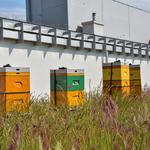Last updated: October 2021
After relevant local regulations had been adapted and allowed for keeping apiaries in the city of Białystok, in 2016, the Institute of Biology at the University of Bialystok put six beehives on its rooftop. The initiative aims at increasing biodiversity and pollination in the city. It promotes beekeeping and sustainable production and consumption patterns, and the honey is a brand product of the University [1,3,4].
Overview
Nature-based solution
- Nature on buildings (external)
- Other
Key challenges
- Green space, habitats and biodiversity (SDG 15)
- Habitat and biodiversity restoration
- Inclusive and effective governance (SDG 16)
- Effective management
- Social justice, cohesion and equity (SDG 10)
- Environmental education
- Sustainable consumption and production (SDG 12)
- Sustainable consumption
- Sustainable production
Focus
Knowledge creation and awareness raising, Strategy, plan or policy development, Monitoring and maintenance of habitats and/or biodiversity
Project objectives
1) Promotion of sustainable production and consumption of honey;
2) Education on the importance of pollinators;
3) Promotion of the university;
4) Increase in biodiversity in urban area [3,4].
Implementation activities
Six beehives on the rooftop of the Institute of Biology of the University of Białystok [4]; Increase in beekeeping in the municipality [1].
Biodiversity conservation or restoration-focused activities
Biodiversity restoration:
- Restore species (native, endangered, or unspecified)
- Restore valued species
- Restore endangered species
- Public engagement
Main beneficiaries
- Researchers/University
- Citizens or community groups
Governance
Management set-up
- Led by non-government actors
Type of initiating organisation
- Researchers/university
Participatory approaches/ community involvement
- Dissemination of information and education
Details on the roles of the organisations involved in the project
After relevant local regulations had been adapted and allowed for keeping apiaries in the city of Białystok, in 2016, the Institute of Biology at the University of Bialystok put six beehives on its rooftop [1,4].
Project implemented in response to ...
... an EU policy or strategy?
Unknown
... a national policy or strategy?
Unknown
... a local policy or strategy?
Yes
(Local councilors have adopted a resolution amending 'The rules of maintaining cleanliness and order in the municipality of Białystok' ('Regulamin utrzymania czystości i porządku na terenie gminy Białystok'). These changes enable the breeding of bees in the city.(1))
Financing
Total cost
Unknown
Source(s) of funding
- Unknown
Type of funding
- Unknown
Non-financial contribution
Type of non-financial contribution
- Provision of labour
- Provision of expertise
Who provided the non-financial contribution?
- Citizens (e.g. volunteering)
Impacts and Monitoring
Environmental impacts
- Green space and habitat
- Enhanced support of pollination
Economic impacts
- Generation of income from NBS
Socio-cultural impacts
- Social justice and cohesion
- Increased access to healthy/affordable food
- Education
- Increased awareness of NBS and their benefits
Type of reported impacts
Achieved impacts
Presence of formal monitoring system
Unknown
Presence of indicators used in reporting
No evidence in public records
Presence of monitoring/ evaluation reports
No evidence in public records
Availability of a web-based monitoring tool
No evidence in public records
References
1. Source link, (2016), 'Bialystok is bee-friendly' ('Białystok przyjazny pszczołom'), Source link (Accessed: 02 September 2020).
2. Sadowska-Dubicka, E., (2016) 'Residents can place beehives on their property' ('Mieszkańcy mogą stawiać na swoich posesjach ule'), Source link (Accessed: 02 September 2020).
3. Kłopotowski, A.,(2016), Roof apiary at university. After honey to biologists' ('Pasieka na dachu UwB. Po miód do biologów'),
Source link (Accessed: 02 September 2020).
4. University website article, 'With passion for honey. University's!' ('Z pasji do miodu. Uniwersyteckiego!'), Source link (Accessed: 02 September 2020).
2. Sadowska-Dubicka, E., (2016) 'Residents can place beehives on their property' ('Mieszkańcy mogą stawiać na swoich posesjach ule'), Source link (Accessed: 02 September 2020).
3. Kłopotowski, A.,(2016), Roof apiary at university. After honey to biologists' ('Pasieka na dachu UwB. Po miód do biologów'),
Source link (Accessed: 02 September 2020).
4. University website article, 'With passion for honey. University's!' ('Z pasji do miodu. Uniwersyteckiego!'), Source link (Accessed: 02 September 2020).



